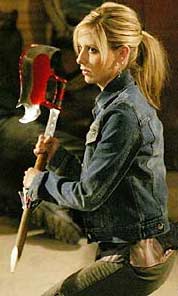From Portal.telegraph.co.uk Buffy The Vampire SlayerClosing the HellmouthThursday 26 June 2003, by Webmaster The final ever episode of Buffy the Vampire Slayer will be broadcast this evening. Richard Matthews, a faithful fan, bids farewell to the series
The issue in question is the transmission of Buffy The Vampire Slayer’s season 7 finale and the end of her televisual tenure - 1997 to 2003. Buffy is over. After four glorious years of complete addiction, I am left without my annual hit of funny, scary, romantic and exciting fantasy. How can anything replace her? As the headstone from season five stated, "She saved the world. A lot." My slide into fandom was made possible by Twentieth Century Fox’s pioneering release of the first two seasons on magnificent, shiny DVD. The ability to view Buffy (and now brooding sister-series Angel) in massive, uninterrupted chunks reveals the depth and character of the show that might otherwise be missed on a weekly basis, where the superficial impression is of a camp, spooky show with a pretty blonde and added kung-fu for flavour. The complete season viewing embellishes the arcs of the story and its commitment to the characters and their world. So what has made Buffy special? Is it creator/genius Joss Whedon’s effortless blend of humour, horror and heart? Or perhaps it’s Buffy’s position as a feminist icon, even though Whedon insists that she is simply a clever conceit - the revenge of all those blonde bimbo, ’damsel-in-distress’ victims from decades of horror movies? In her own words "I’m not much for the damselling". Consider the spin-off show Angel: equal to Buffy in writing, consistency, talent and production value, it lacks resonance because the lead is a brooding hunk instead of a wisecracking, blonde, butt-kicking beauty. Buffy has faced numerous apocalypses; died - twice; been resurrected; fallen in love with a moody vampire-with-a-soul; killed said lover; fallen in lust with a technologically neutered bad-boy vampire punk; stopped her mega-Wicca best friend from destroying the world; gone to college; flunked out; starred in her own musical; lost her mum to cancer; had a mystical energy key turned into a sister; and worked at a fast food joint. The irony of Buffy (beyond the self-referential tone of the show itself) is that its reputation far exceeds its audience figures. It attracts an audience of approximately four million viewers in the US every week (down from its Season Three watermark of more than five million), in comparison to ER and 24 which pull in almost five times that number. In fact, the UK audience is often comparable to the US, which is striking given the vastly larger TV audience in America. There is an unwritten rule that restricts the life span of American genre television to a healthy seven seasons of creativity and fan adulation. Unlike high-profile drama successes like ER, the fantasy or sci-fi shows that brave the post-seven year itch and go forward into season eight often face the reality of diminishing returns and lost audiences. Joss Whedon and Sarah Michelle Gellar have both stated a desire to finish at the top of their game. So the seven season rule-of-thumb came into play. But how does Buffy’s farewell performance hold up? Sarah Michelle Gellar is perhaps the best she’s ever been, rediscovering form not witnessed since her Season Three tussle with bad Angel alter ego, Angelus. She is aided by her onscreen chemistry with James Marsters as Spike. He has had a growing fanbase since his very first appearance and, in the final episode, he is a revelation: allowed to revel in his humanity and express a multitude of emotions at key moments. Joss Whedon clearly understands his audience. After establishing a fanbase-splitting tension between Spike and Angel in the penultimate episode cliffhanger, the brooding one is sent swishing his long coat back to his own show, leaving peroxide bad-boy Spike to follow his most heroic of character arcs. Likewise, back in the writing hands of Whedon himself for the finale, the now cycloptic Xander is back to his quipping, pathos-sponging best. Instead of completist soap operatics, we are provided with a welter of Lord of the Rings scale vampire hoards and kung-fu swordplay from the nubile slayerettes. Buffy, Xander, Willow and Giles stand together, very much as they did in the first three seasons, and banter their hearts out. This is their umpteenth apocalypse and it feels a little ’same-old’, a riff on previous end-of-the-world scenarios. But the final, victorious conceit is, to paraphrase Willow, "nifty", and aptly focuses on empowering women everywhere, something you suspect the show has been trying to do for a long time, even if the final montage of young girls feeling the surge of shared power is wee bit twee. Buffy’s final episode is not the best ever (The Body, Hush, Becoming and Once More With Feeling fit that bill). It may not even rank as the second best season closer. But it does refuse to pander while still rewarding those who have avidly viewed the show. It hits enough familiar and climactic notes to leave fans sated, but dangles a resolution that doesn’t tie the fate of the characters in a neat, crimson bow. It doesn’t end with a tear, a laugh or scream: the half-smile that crosses Buffy’s face hints at remembrances and things to come, a reminder of why the show was so good in the first place. You always went away happy but wanting more. I almost crippled myself jumping to turn over to Angel . . . Buffy the Vampire Slayer concludes tonight at 8pm on Sky One. |
